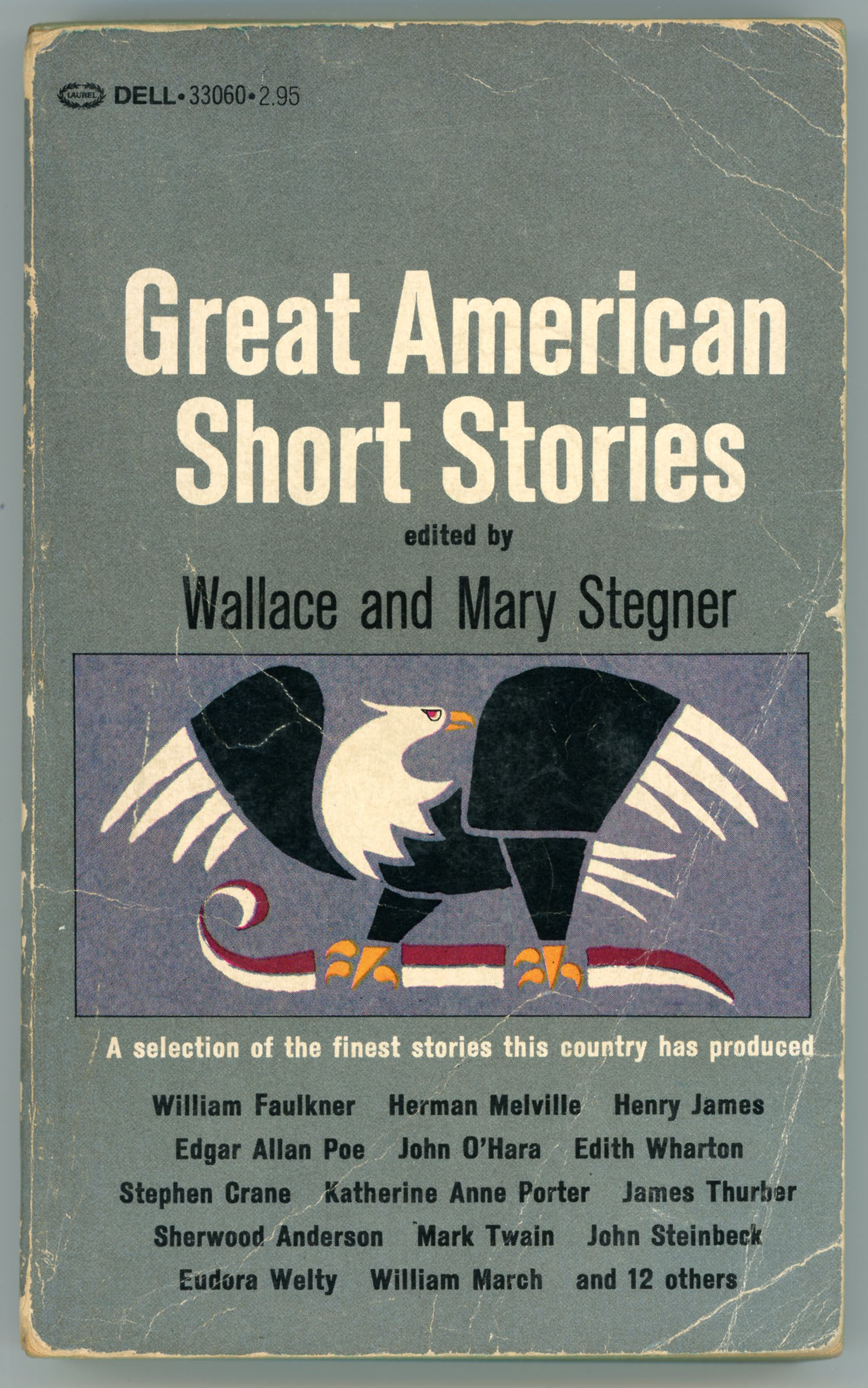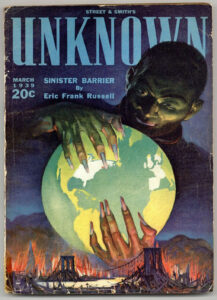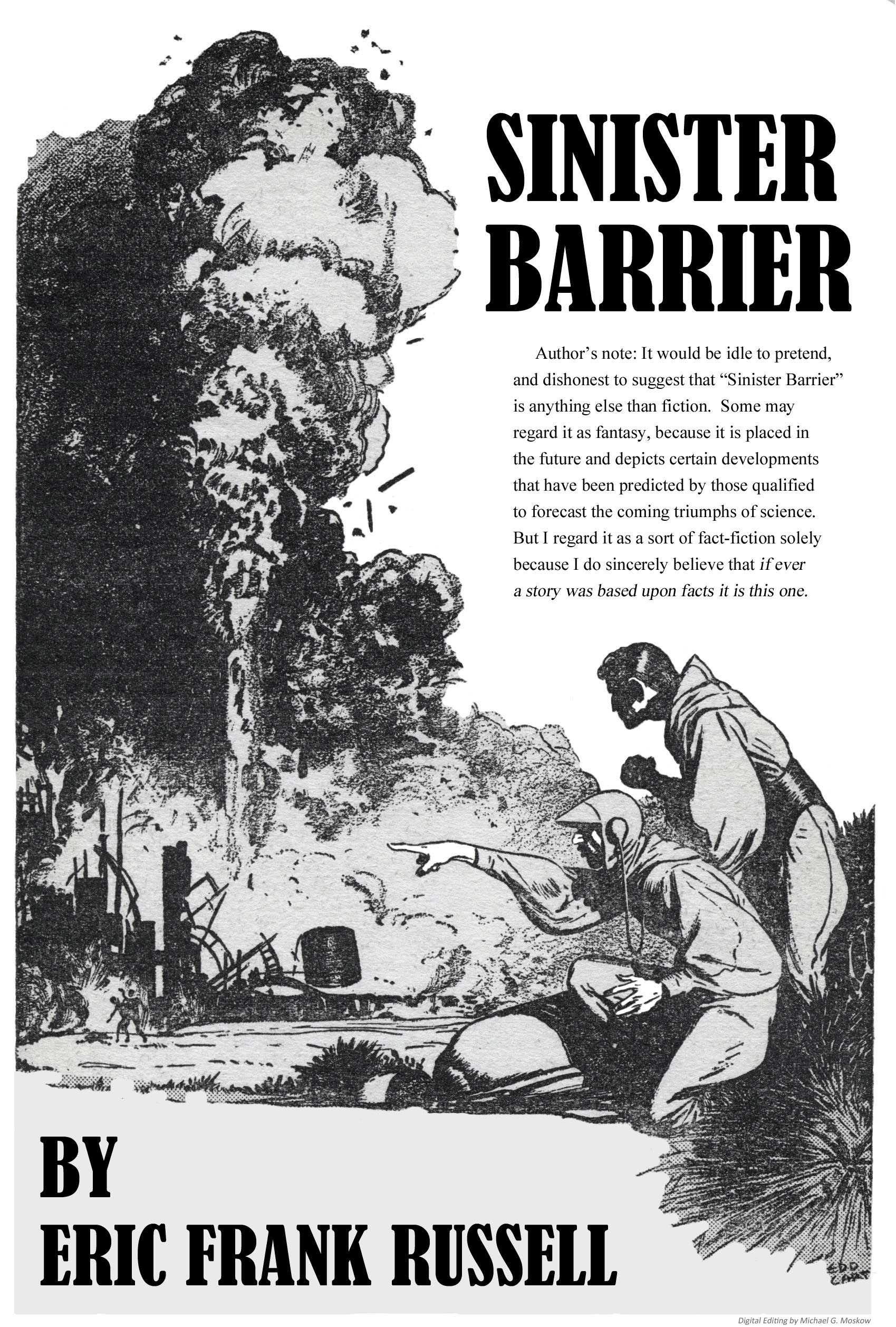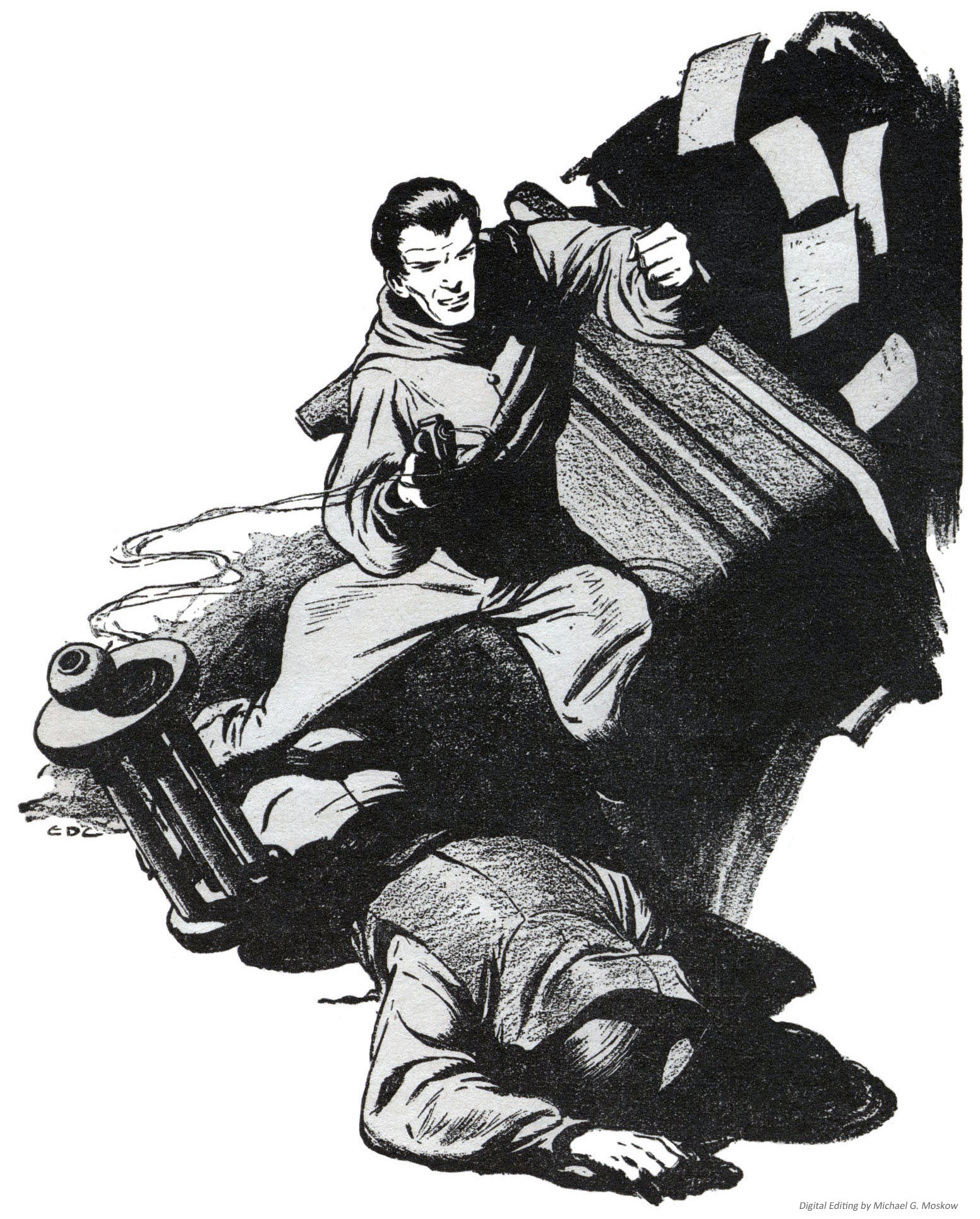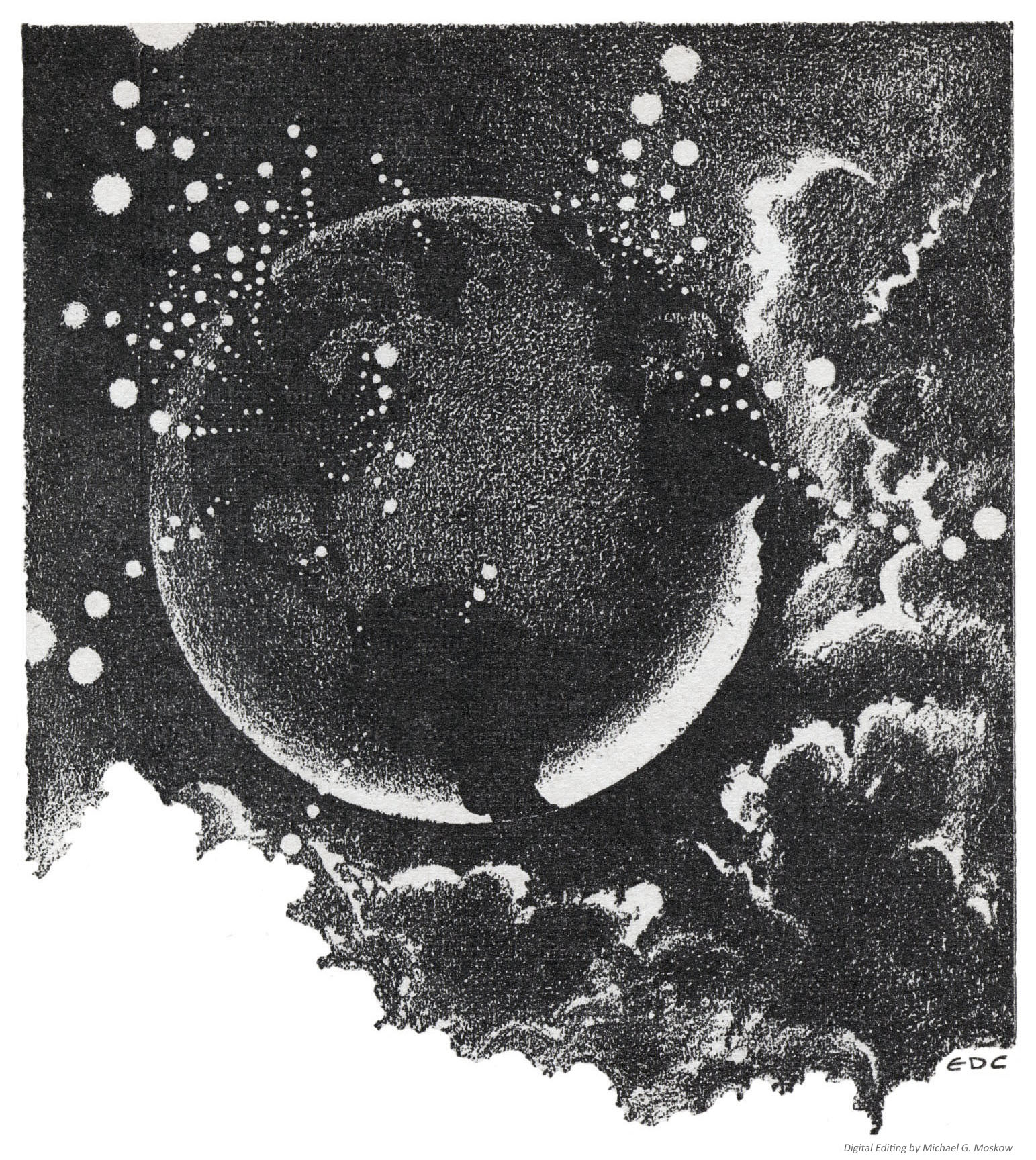Dell’s 1957 imprint of Wallace and Mary Stegner’s Great American Short Stories features cover art that in its simplicity and straightforwardness leaves little to the imagination, and has a style and “air” entirely redolent of iconography of the 18th and 19th centuries: An eagle (a bald eagle, it seems) aggressively and confidently perched atop a flag. The back cover is even simpler; as simple as simple can be: The artless names of the authors whose works are found within the book, sans story titles. That’s all!
Of the stories within this book, I’ve only read two: Poe’s “The Fall of the House of Usher”, and, Melville’s “Bartleby the Scrivener”; the former in high school, and the latter in college, and these “in” an America that no longer exists. Though I cannot say that I “liked” these works, I understood and appreciated them. In the former, I can see and appreciate a vague foundation for the works of H.P. Lovecraft, but the latter – though memorable – gave no inkling of the power and depth of “Moby Dick”, which I read some decades later and found truly wonderful.
As you can see, I’ve included videos for Poe’s and Melville’s tales, a links to the cinematic version of Bret Harte’s Tennessee’s Partner, and links to two film versions of Conrad Aiken’s “Silent Snow, Secret Snow”: One to Gene Kearney’s 1964 adaptation, and the other to the production that aired on Rod Serling’s Night Gallery, on October 20, 1971.
Of these four films I’ve only seen the latter. As an ambivalent and wavering viewer of Night Gallery (which more often that not deeply disappointed me because of the show’s emphasis on horror and fantasy over science fiction, let alone its inability to reach the high expectations I had from Serling’s stellar The Twilight Zone – albeit there were a few absolutely exceptional episodes, like “They’re Tearing Down Tim Riley’s Bar“) I watched “Silent Snow, Secret Snow” on the very night it was broadcast. Assuming that the Night Gallery adaptation was faithful to Aiken’s text, I thought – even then! – the author’s tale was a truly awful story, which – in retrospect – seemed to self-indulgently romanticize social alienation, mental illness, or both. Yet, to be fair to Aiken, given the tragic and traumatic nature of his childhood, perhaps the story’s composition when he was some 45 years of age was simply a sorely needed epistolary catharsis.
Rip Van Winkle
by Washington Irving
~~~~~~~~~~~~~~~~~~~~~~~~~~~~~~
Young Goodman Brown
by Nathaniel Hawthorne
~~~~~~~~~~~~~~~~~~~~~~~~~~~~~~
The Fall of the House of Usher
by Edgar Allan Poe
“Edgar Allan Poe — The Fall of the House of Usher — Short Story Film”
At pressmin video channel
~~~~~~~~~~~~~~~~~~~~~~~~~~~~~~
Bartleby the Scrivener
by Herman Melville
“Bartleby The Scrivener (Movie), Herman Melville 1853”
At Craig Campbell video channel
~~~~~~~~~~~~~~~~~~~~~~~~~~~~~~
Baker’s Bluejay Yarn
by Mark Twain
~~~~~~~~~~~~~~~~~~~~~~~~~~~~~~
Tennessee’s Partner
by Bret Harte
Film Adaptation
“Tennessee’s Partner (1955) John Payne, Ronald Reagan, Rhonda Fleming. Western”, at Daily Motion
At Internet Movie Database
At Wikipedia
~~~~~~~~~~~~~~~~~~~~~~~~~~~~~~
The Boarded Window
by Ambrose Bierce
~~~~~~~~~~~~~~~~~~~~~~~~~~~~~~
The Real Thing
by Henry James
~~~~~~~~~~~~~~~~~~~~~~~~~~~~~~
A Village Singer
by Mary E. Wilkins Freeman
~~~~~~~~~~~~~~~~~~~~~~~~~~~~~~
Mrs. Ripley’s Trip
by Hamlin Garland
~~~~~~~~~~~~~~~~~~~~~~~~~~~~~~
A Municipal Report
by O’Henry
~~~~~~~~~~~~~~~~~~~~~~~~~~~~~~
Roman Fever
by Edith Wharton
~~~~~~~~~~~~~~~~~~~~~~~~~~~~~~
The Open Boat
by Stephen Crane
~~~~~~~~~~~~~~~~~~~~~~~~~~~~~~
Unlighted Lamps
by Sherwood Anderson
~~~~~~~~~~~~~~~~~~~~~~~~~~~~~~
The Man Who Saw Through Heaven
by Wilbur Daniel Steele
~~~~~~~~~~~~~~~~~~~~~~~~~~~~~~
Silent Snow, Secret Snow
by Conrad Aiken
Film Adaptations
Gene Kearney, 1964
Rod Serling’s Night Gallery, October 20, 1971
~~~~~~~~~~~~~~~~~~~~~~~~~~~~~~
He
by Katherine Anne Porter
~~~~~~~~~~~~~~~~~~~~~~~~~~~~~~
The Catbird Seat
by James Thurber
~~~~~~~~~~~~~~~~~~~~~~~~~~~~~~
The Little Wife
by William March
~~~~~~~~~~~~~~~~~~~~~~~~~~~~~~
Wash
by William Paulkner
~~~~~~~~~~~~~~~~~~~~~~~~~~~~~~
The Snake
by John Steinbeck
~~~~~~~~~~~~~~~~~~~~~~~~~~~~~~
To the Mountains
by Paul Horgan
~~~~~~~~~~~~~~~~~~~~~~~~~~~~~~
Over the River and through the Wood
by John O’Hara
~~~~~~~~~~~~~~~~~~~~~~~~~~~~~~
The Wind and the Snow of Winter
by Walter Van Tilburg Clark
~~~~~~~~~~~~~~~~~~~~~~~~~~~~~~
Powerhouse
by Eudora Welty
~~~~~~~~~~~~~~~~~~~~~~~~~~~~~~
In Greenwich There Are Many Gravelled Walks
by Hortense Calisher
Some Last Points
Wallace E. Stegner, at Wikipedia

